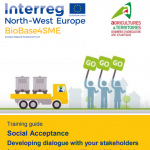Boosting Bioeconomy Knowledge in Schools – free online course
Boosting Bioeconomy Knowledge in Schools online course. To learn how you can explore sustainable economic solutions with your students! Knowledge about bioeconomy is an essential requirement for students of the 21st century. Not only will the bioeconomy sector provide the jobs of the future, this knowledge will help your students better understand the challenges of tomorrow’s society and enhance their skills as responsible citizens.


